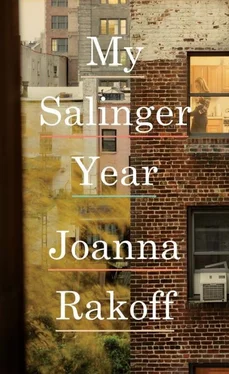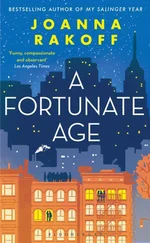My life appeared to be a project in catching up. Thus, it had been a long time since I’d read what Max referred to as “commercial fiction.” I took the title page off the manuscript with something close to anxiety. What if I had outgrown Judy Blume?
But no one, I suppose, outgrows Judy Blume. When I was a kid, her books had seemed to speak directly to my own experience, to the confusion and loneliness of an outsider. So why was I surprised to find her new heroine, Vix, ensconced in an office in midtown Manhattan, eating lunch at her desk? Not just lunch, but take-out salad from the deli around the corner?
By the final pages, when Vix says that her only regret is that her oldest friend, Caitlin, couldn’t confide in her, couldn’t explain the choices she’d made, I was quietly crying. It was past midnight and Don had fallen asleep, but he awoke, startled. “What’s wrong?” he asked. “Buba, what happened?”
But I couldn’t explain. “It’s not a kids’ book,” I said, instead, through tears. He looked at me, bewildered. “My boss said she didn’t get it. And I thought it was because she didn’t understand kids’ books or kids. But it’s not a kids’ book. It’s a novel for grown-ups.”
“Okay,” said Don. “I think you might need to go to sleep.” He yawned widely. “You can tell her in the morning.”
I nodded. But the minute I put the manuscript down and closed my eyes, my thoughts began racing again. Why couldn’t Caitlin confide in Vix? Because she knew Vix would judge her. Because she knew Vix would refuse to understand. Because it was easier simply to pretend everything was all right.
The next morning, I rose earlier than usual and dressed carefully in a sober brown knit shift with a matching jacket, purchased for me by my mother. The more closely I resembled a 1965 coed, the more seriously—and calmly—my boss regarded me, and I wanted her to take me seriously that morning when we discussed the Judy Blume novel.
I smoothed on foundation, dusted my nose with powder, and swiped my lips with lipstick, a futile gesture since it would be gone by the time I got to the office. Then I tucked the manuscript back in my bag and left, the flimsy door creaking shut behind me with an ineffectual little click.
Don had left hours earlier for his new job, watering plants in office buildings in the financial district—Marc had somehow arranged this for him, through a client—which paid ridiculously well considering how easy it was, but required leaving the house at four thirty in the morning so the plants would be watered by the time the employees of Deutsche Bank and Morgan Stanley arrived at their offices.
On Bedford Avenue, other people like me—young men and women in retro office wear, heading to jobs at film production companies and graphic design firms and recording studios—were sleepily converging on the sidewalk, blinking beneath their Navy safety glasses and round schoolboy frames, messenger bags slung across their chests. It was still cool out, oddly cold for May, and I shivered a little in my thin jacket, my legs breaking out in goose bumps, then ducked into the Polish bakery—my favorite of the three on this one block alone—for coffee and a Danish. It was only when I reached into my bag to pay that I remembered the letter from my college boyfriend, now crushed under the manuscript. A rush of longing hit me so hard that the room, ever so slightly, began to spin.
I’ll read it on the subway , I thought, grabbing my coffee and taking a sticky bite of pastry. But both trains were so crowded I had to stand, clutching a pole, my coffee sloshing dangerously. I’ll read it when I get to the office , I thought.
But I had underestimated the Judy situation: again, I found my boss waiting for me, this time pacing in front of my desk, cigarette in hand.
“Well, what did you think?” she asked, by way of a greeting.
“I liked it.” I pulled the manuscript out of my bag, tapping it on the desk to straighten the pages. Surreptitiously, I ran my tongue around my mouth, wondering if black prune residue from my Danish was lodged in the crevices between my teeth.
“Really?” she asked. “But what did you make of it? It’s not a kids’ book, is it?”
“It’s not a kids’ book,” I confirmed. “It’s a novel for grown-ups. About kids. Or, teenagers. In part.” I hadn’t thought I’d be nervous, but I was, clearly.
My boss tapped her finger on my desk impatiently. “My concern is: Am I going to be able to sell this? Will adults really read a book about kids?”
The book’s not about kids , I started to protest, but something in her tone of voice—impatience, resentment, exhaustion—stopped me. She didn’t want my opinion, I realized, with a sudden jolt. Maybe she’d told herself that she did, that my thoughts, as part of Judy Blume’s devoted audience, could be valuable. Or maybe Max or Lucy had told her I was a good reader, a helpful reader. Both had taken on clients based on my initial reads. But my boss was different. She didn’t want input from a twenty-four-year-old. She wanted me to agree with her. That was my job.
“Lots of great novels have child protagonists,” I began instead, knowing this was absolutely the wrong tack. “ Oliver Twist—”
“This isn’t Oliver Twist ,” she informed me, with a mirthless laugh. “But you would read it?”
I nodded. I was certain that I was not alone. “ Many people would read this book. Would buy this book. Everyone who loved her as a kid.”
She looked at me uncomprehendingly, not—I realized later—because she didn’t understand the scope of Judy’s fame, the way her books had reshaped the narrative of childhood, but because my boss’s relationship to literature, to books, to stories, to writers themselves, was entirely different from mine. She’d never loved books in the way I’d loved Starring Sally J. Freedman as Herself and Deenie . Or the way Don—I felt a strange pang of affection for him—had loved Then Again, Maybe I Won’t . She’d never spent entire days lying on her bed reading, entire nights making up complicated stories in her head. She’d not dreamed of willing herself into Anne of Green Gables and Jane Eyre so that she might have real friends, friends who understood her thorny desires and dreams. How could she spend her days—her life —ushering books into publication but not love them in the way that I did, the way that they needed to be loved?
I glanced into her cool, intelligent eyes. Was I wrong? Was this all wrong? Had she once been just like me? And time—and publishing—had changed her?
“I just don’t know if I can sell it,” she told me. And there, I suppose, was my answer. She was a businessperson.
“There’s a built-in audience ,” I said, with more passion than I’d anticipated. “All those kids who read her when they were little.” I paused for a moment, unsure if I should go on. “But also, I just think women will relate to these characters. It’s kind of a universal story. About female friendship.” This sounded like some of the bad jacket material that crossed my desk, but it was also true.
My boss looked at me and smiled. “Hmm,” she said. “Could be.”
Was she really, really going to tell Judy Blume that she couldn’t sell this novel? This eminently readable, enjoyable novel that surely many, many people would buy? As a parade of clients walked out her door, never to return?
“Well,” she said, lighting another cigarette. “You’ve had your fun”— Fun? I thought as she ambled back into her office—“but now it’s time to get to work. I’ve got a lot of dictation for you.” She handed me a few tapes and some correspondence to which I would refer. “Let’s take care of that this morning.”
Читать дальше












